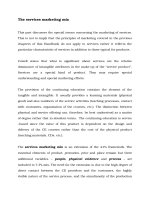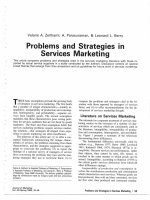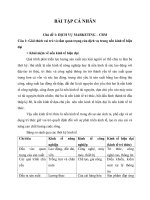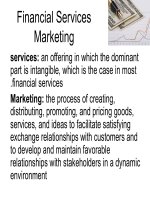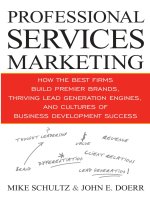Services marketing crm
Bạn đang xem bản rút gọn của tài liệu. Xem và tải ngay bản đầy đủ của tài liệu tại đây (242.16 KB, 16 trang )
SERVICES MARKETING - CRM
Answer any FIVE questions All
questions carry equal marks
1 Explain the role and significance of services in the modern economy.
2 Answer the following:
(a) The marketing planning process.
(b) Monitory marketing planning and services.
3 Answer the following:
(a) Service market segmentation.
(b) Customer loyalty.
4 Answer the following:
(a) Planning and branding service products.
(b) New service development.
5 Write a detailed note on pricing strategies for services.
6 Answer the following:
(a) Explain the role of marketing communication.
(b) Service promotion.
7 Explain the role of intermediaries in planning and managing service delivery.
8 Write a detailed note on CRM programmers.
1.
CONTENT
Topic 2: MARKETING MANAGEMENT
Question 1. Explain the following:
(a) Production concept
(b) Product line
(c) Augmented product
(d) Social marketing concept.
Answer question 1:
(a) Production concept
Goods production is where the goods is produced but it does not calculate to the
customer’s choice or satisfaction, the goods is produced by believing. Producer believe
that goods which is sold by customer’s demand. Ford is the first champion for this
concept, said that American are ready to pay for any car which produced by Ford.
However, the production industry increase continuosly with more sellers, so this concept
change as per destination where goods are produced with customer’s demand and choice.
Dell is the first person who was in the good production industry according to customer’s
segment (student, music person, businessman…). In summary, production is all stages to
create the value, benefits to customers and company earn profits though this activity. So
according to Marketing concept, any activity does not bring value and benefit to customer
it does not calle production. (Philips Kotler Marketing book)
(b) Product line
Product line is a set of product which is similar about structure, function,
model/appearance and criteria which are easy to determine.
Example:
- Computer has many kinds, so each company produces different set such as
Dellx130, Sony, Acer5100, Hp 5600, Nokia x, y, z, iPhone 5S.
- Procter & Gamble have set of washing powder as: Tide, Rejoice , Viso ...., soap
as: Camay , Zest , Coast, CK ...
(c) Augmented product
One product includes mental and physical aspect, mental aspect will increase the
value of product. Mental aspect includes: insurance policy, service or setting, and
increasing value to customer, and help the customers use the product more easier call
Augmented product
The producer always thinks three levels when they produce good. (1) core product is the
basic benefit of good bringing to customer, for instance with washing powder tide having
the basic value is clothes wiping out; (2) actual product is the invisible part of product
including product quality, model, brand name, package, characteristic; (3) augmented
product is the services or supplementary benefit such as directions, varanteer, service
after sell, delivery. Some scholars add more level later as potential product. When design
one product the producer have to pay attention to all product levels. The differences
between level of product will create the competition ability for product. “the competition
is not only product by product but also the adding value from each product item including
package, service, advertising, inventory, and other conditions in which produers thinks
important”.
(d) Social marketing concept:
Philip Kotler (2002) has the clear concept about the social marketing concept:
“social marketing concept is utilizing marketing rules and technologies to make
impression to indicated customers to make them accepted, rejected, or removed with their
given behaviours which give benefit to individual, group or society.
Alan Andreasen (1995) had the more academic concept: “Social marketing is to
apply marketing technics in business in order to plan, analyze, implement and give price
to designed programmes in order to impact to indicated consumers’ voluntary behaviours
in order to bring the value to them and society where they live”.
Nedra Kline Weinreich (1999) had the simple concept “social marketing uses the
marketing business technic to encourage one behavious in order to improve health,
happiness of each customer or all society”.
Some application of social marketing with professional, makerting manner and
bring with high effective are non-governmental organization, non-profit. For instances:
- Project with social marketing of condom and treating HIV/AIDS
- Clean water project and higene envirernment clearance of DANIDA
- Campaign “house without smoke” of woman association of Hau Giang.
In Vietnam, Societal Marketing Concept, there are many big companies,
organizationsm which implemented very successful with marketing campaign. Unilever
is one of the companies which are famous in this field with many brand name applying
Social marketing, Omo with campaign Omo white shirt, flashing future" ect.,
Question 2: Explain various concepts of marketing with suitable examples.
Answer question 2:
Marketing is the good product sold in convenient place of indicated buyer with
suitable proice (Adcoketal).
Ex: there is one clothes company with premium brand name, it brings its product to
promote area to sell it means that this company doesn’t know any thing about marketing.
It means that this company just sell what it has, not what customer need.
Marketing is the trendary activity to customer in ordert o satisfy customer’s
demand and needs through process of communication (Kotler 1980).
Ex: EVN set up the electronic to their customer in order to support customer more
convenient, customer no waiste their time to write the number monthly, and increase
customer’s truth with EVN about electric quantity which consumes monthly.
Marketing is the duty in organization structure and colletion of all process in order
to create, exchange, transfer values to customers and manage customers through different
ways in order to bring benefit to organization and share holders (American Marketing
Association – 2008).
Ex: HONDA company is voluntary company to produce the new products, example
with motokibe in Vietnam, HONDA improve from model, high techinology, suitable
price, place, promotion.
Question 3: Explain the market segmentation and suitable examples.
Answer question 3:
Market segmentation or objective marketing is the concept which is different
from general marketing and multiform product marketing. The objective of marketing
market segmentation is to devide market into small segmentation in order to easily
observe, getting easily and meeting easily because of company resource limited. It means
that company cannot meet all market, and each company has the different strength in
comparation with their competitor. So to meet the market demand the company has to
segment the market, choose the indicated market in order to compete and survive with
competitor.
Currently most of the companies has left the common market, they start to follow
up with indicated market. So there are some market they will withdraw or work
temporary, and some market they will focus to invest. So we can said that market
segmentation is to determine which market they will compete and which market they will
leave.
Ex: Car market, we can see the high market iincluding Maybach, Rolls Royce...
then Mercedes,BMW, Audi... mediate market Toyota, Honda, Ford; while the low market
segmentation having Kia Motors, China…
The objective of market segmentation is to devide the market in small market with
customers who have the same demand. Identification of market segmentation will support
company: (1) create the product and service meet customer’s specific demand and (2)
concentration of marketing resource is more effective.
Example:
You have received the invitation to take part in the workshop of consultantcy and
service of retirement. You are one of the many people receiving this invitation.
Throughout the database analysis showed that you have the following criteria:
+ You jhave property (showing in the land tax where you are living).
+ You are in group of people nearly to retirement.
+ You live in closely with the workshop happen..
Some of the above criteria set up you into the group op people that the retired planner
want to focus. The planner believe that they send the letter with tiltle “Let our expert set
up your future plan” which will can be attract you. It shows that company try to focus on
their marketing resources to customer who is interested their company service and these
customers have enough finance capability to pay this service.
Question 4: “PLC as a tool for marketing strategy" justify.
Answer question 4:
Product Life Cycle (PLC) is the important concept in marketing. It helps
management marketer understood more process of movement and changing in the
market, competitor’s activities and method to access necessary differnently to product
cycle.
Different product has the different life cycle and the stage of life cycle has the
different length and shorthen, consumption and benefit of different stage. It means that
company has to have the differebt marketing stategy, finance, production, supply, and
human resource into each stage of product life cycle.
Basic product life cycle has the sin figure and there are four clear stage:
1. Introduction is the stage that product enter the market. The turnover in this stage
increases slowly, no benefit because of cost for introduce product in market.
2. Development is the stage of product which is received faster and benefit
increasing significantly.
3. Growth is the stage that turnover increase but slow down due to almost potential
customer who access to product. Profit is slow down because of increasing cost to protect
product with competitors.
4. Decline is the stage of turnover reducing and profit reducing as well. Some
marketing strategies for each product life cycle
a. Introduction
Product is the first time entering to this stage. There are four strategy methods
which can be implemented.
- Rapid skimming strategy is the strategy of launching new products to market with initial
high prices and high level of fans. Enterprise features to ensure high rates of gross profit
per unit of product at the highest level. Enterprise costs more for the fans operate as
advertising, promotions, ... to convince customers of the benefits of the product and to
increase market penetration rate. This strategy is usually applied in most cases unknown
market potential products; who were known to have been the product desired products
and are willing to pay high prices to buy this product; business in the face of potential
competition; and when businesses want to create brand preference.
- Strategy is slow skimming strategy launched new products to market with initial high
price and low level fans. Enterprise believes that high prices will create higher gross
profit level per unit of product, while a marketing costs keeps low, and therefore will be
more profitable skimmers on the market. This strategy is applied when the market has
size restriction; most customer known products; buyers are willing to pay high prices;
and potential competition is not capable of happening.
- Rapid penetration strategy is the strategy of launching new products to the market with
high-level supporters and initially low price, hoping to achieve rapid penetration rate and
the largest market share. This strategy is appropriate only when the market is large and
unknown products; most people are sensitive to purchase price; market potentially stiff
competition; Businesses can achieve effective economies according to scale and
cumulative production experience.
- Slow penetration strategy is the strategy of launching new products into the market with
low initial price and low fans lavel. Low prices will encourage consumers quickly
accepted products, low fan cost to achieve higher net income. This strategy is appropriate
for markets with strong price elasticity demand, but little elasticity with fan elements;
large-scale market, well known products; and potential competitiveness.
b. Development
During the development phase, enterprises can deploy a number of marketing
strategies to prolong the rapid growth of the market.
Strategies to improve product quality, enhanced features and new models for new
products.
- Entry strategy into new market segments.
- Strategies to expand the scope of existing distribution channels and to participate in the
new distribution.
- Strategic moving target from referral advertising items to create trust and preference
products.
- Strategy timely discounts to attract customers who are sensitive to price.
Market challenges in the development phase is shifted from building awareness of
product to brand name. Since these new competitors are always attracted to the increasing
of revenue and profit, so you need to focus on maximizing the growth of the company in
order to increase sales or expand product such as the introduction of lower price iPod
Mini Apple in 2005.
C. Growth
- Up to a certain point, an increase of product sales will slow down and enter the
product relatively prolific period. This stage usually lasts prolific than the previous stage,
posing hardships for marketing executives. Prolific period can be divided into three
periods. The first period was prolific growth, the growth rate began declining sales; no
new distribution channels to increase, although some people still accept late to buy
products. Second period was prolific stable sales, turnover per capita does not change
because the market was saturated. The majority of these potential customers to try the
product and future consumption depending on population growth and replacement
demand. Third period was prolific decline, scale sales declining, customers switching to
other products and substitute products.
- The pace of sales growth slowed generates excess production capacity in the
industry and making competition more significantly. The competitors are often used to
sell off. They promote and enhance advertising relationships with distributors and
intermediary clients, funding additional research and development to create better designs
for products. Ultimately, this work will make profits decline. Some major competitors
began to withdraw from the market. In the only remaining branch of that business firm
trend is mainly trying to gain their competitive advantage.
- In the mature stage/growth, firms often seek to eliminate weak products and
focus resources on more profitable products, and sometimes disregard the enormous
potential of existing old products themselves. Marketers need to consider a system of
market strategy, product and marketing improvements - mix.
- Market innovation.
Enterprises try to improve existing products consumed in two ways: increasing the
number of people using the product and increase the use of each. Increasing the number
of products can be used by seeking new customers (changing impact on the attitude of
not using the product); penetrating new market segments; or win the customers of
competitors.
Increase the level of use of the existing clients by convincing them to use more often;
each session with more numbers; discover new uses and to encourage people to use the
product in many ways more diverse. Marketers can also reposition the brand product in
order to attract a larger market segment or capable of further development
- Product innovation.
The marketing managers can also innovation of product attributes such as quality,
features, styling to attract new customers and get more use.
The strategy aims to strengthen the quality of performance enhancing products
such as durability, reliability, taste, speed. This strategy is effective as long as the quality
can also be improved, buyers still believe claims about the quality has improved and
there are many who wish to purchase a higher quality.
Strategy to enhance added feature of the new characteristics (such as size, weight,
material fabrication, parts included) to augment the utility, diversity, safety levels or the
convenience products.
Strengthen strategic characteristics of the product is capable of creating images
and spirit of innovation and enterprise enlisted the loyalty of a number of market
segments appreciate the attributes. However, this strategy is characterized by competitors
mimic competition.
- Strategic design improvements to increase the aesthetic appeal of the product.
The regular launch of new product designs are competitive in the form of products, rather
than compete on quality or characteristics of the product. The essence of the strategy is to
improve designs created unique characteristics of form, structure and color packaging
recognizable to customers in order to attract new customers while still taking advantage
of the customer loyalty the products with trademarks.
For example: computer industry is currently approaching the ripe stage, if not the
stage is ripe. The manufacturers of hardware and software products continuously
improving, but that does not stimulate customers to abandon their machines are used to
switch to the new machine. Even Microsoft also recognizes that customers are large
companies which also do not like to regularly update the latest version of Microsoft.
These customers see that the cost spent on training and the use of substitutes is not much
benefit. As the personal computer business plan to use discounts to stimulate purchases.
Here some examples of revitalized product:
* Notebooks supporting more traditional radio functions
* GPS applications in passenger cars.
* These components are anti-tartar toothpastes complement traditional
D. Decline stages
After some time on the market, most of the products and brands will gradually
reduce its sales. The sales decline may be faster or slower, or stable at a low level for a
long time, but basically no longer profitable as before. It is an expression of the decay
phase.
Sales may decline for many different reasons, such as technological innovation,
changing customer preferences, competition is increasing. It all led to surplus production
capacity, product prices is down leading to the rapid decline of profits. As sales and
profits decline, some firms withdraw from the market, the remaining enterprises can
reduce output, abandoning the small market segment and narrow product distribution
network. They can also cut costs and reduce advertising price down further.
The choice of marketing strategy in the decline stage of the product depends very
much on the relative attractiveness of the industry and the competitive strength of the
business in that sector.
Enterprises need to reconsider your poor product is no longer vogue market. First
job is to identify products that have to or less decline stage by regularly reviewing sales,
market share, cost and profit trends of each product.
With each product are in decline period, the administrator must decide whether to
implement any marketing strategy: maintaining, harvesting or dredging to remove it.
First, businesses may decide to maintain its effectiveness by investing more in the hope
the competition will give up this industry. Second, businesses may decide to harvest
finish products meant to cut costs (facility and equipment maintenance, R & D,
advertising, the number of sales staff) and hope that sales still standing in some time. If
successful, this solution also increases business profits in a short time. Finally, businesses
can also eliminate the product from its product portfolio or sell it to another business.
Abstract
* Competitive strategy involves the creation of distinctive features customers
appreciate.
* When setting strategy, management must determine the differences are
appreciated and customers do appreciate that difference.
* Marketing strategy must be consistent with the company's strategy . Prepared
marketing strategy should answer the question: Why do customers buy product (or
service) rather than our competitor 's?
* Marketing strategy defined target market, product or service will be how to
locate, and it will be branding the stars?
* A new product will typically go through four stages of the product life cycle:
introduction, development, maturation/growth and decline. Each stage represents a
different challenge for those working in marketing.
* In the introduction stage, the task of the marketing department is to create
awareness about the types of products and guide potential customers about how they can
use new products to cater for their interests.
* These products and services are undergoing a period of rapid development
revenue per unit of product will attract competitors. The challenge in this phase is to
build the brand.
* In the mature stage, the seller's market is in favor of the buyers market. Profits
fell by manufacturers struggle together to gain greater market share. The marketing
challenges facing revived brand.
* Decline is the final stage of the product life cycle. During this period, sales of
products continued to fall, the efforts to improve marketing new uses for their old
products, find new markets, or to reap as much profit as possible when the product
lifecycle coming to an end product.
Question 8: Explain "direct marketing" and its applicability with examples.
Answer question 8.
1. Concept:
Previously, direct marketing is understood as a form of marketing that product or
service is transferred from producers to consumers, not through any intermediaries.
Nowadays, with the development of communication technology, direct marketing must
be understood as an interactive marketing system that uses one or more advertising media
to effect a measurable response in return is to communicate services at any location.
Thus, direct marketing is done to obtain a measurable response, typically a buyer's orders
(also called direct marketing orders).
There are two main characteristics to distinguish direct marketing with other types of
marketing:
• First, it attempts to send messages directly to consumers. It uses a form of
commercial communication (direct mail, email, phone offers,...) to send to
customers or businesses.
• The second characteristic is the emphasis on the positive feedback can track and
measure customes.
2. Benefits of direct marketing (direct marketing)
Today, due to the development of the means of communication, businesses can
use many ways to communicate directly with customers. Manufacturers, retailers, service
companies, catalog sales company, and non-profit organizations are using Direct
Marketing (Direct Marketing).
Direct Marketing offers many benefits to consumers, such as:
- The order via e-mail to that e-mail purchase is fun, convenient, and not be
harassed (harassment).
- They may be more understanding of products and services without spending time
having salespeople
Direct marketing also provides benefits for sellers such as:
- Can select more better prospects.
- It can build continuous relationships with each client.
- It is possible to potential customers at the right time and be more receptive.
- You can test how changes in advertising, title, price, benefits,...
- Competitors do not see is the strategy of the company dedicated to our
customers.
- Evaluate effectiveness can be measured because of the customer response.
3. The goal of Direct Marketing (Direct Marketing)
The goal of Direct Marketing (Direct Marketing) want to achieve is to make
potential customers buy immediately. The success of the campaign reflected a response
rate (response rate).
In addition, Direct Marketing (Direct Marketing) also has the following
objectives:
- Impact on awareness and purchase intention of customers later.
- Create opportunities for salespeople.
- Send messages and images to emphasize the preferred company.
- Information and guide clients to prepare for the next purchase
4. Several forms of Direct Marketing (Direct Marketing):
• Direct Mail, in the form of the direct the marketers will send postal mail to the
customer or to regional clients in their portfolio.
• Email marketing, in this form, the marketer will send a letter via email to its
customers. One thing worries in this form of marketing is junk mail (spam), the letter will
put off other legitimate email. The result is a very fast growth of spam, many email
service providers and IPS has increased the effectiveness of the program against it.
• Door to Door Leaflet Marketing, marketing the form here is used in many
consumer foods industry (Fast Food Industries). This mode focuses entirely by region.
• Direct response television marketing, there are two forms of long-term contracts
(long form) and short -term contracts (short form ). Long form uses a long-time period
(paragraph 30 mins) to describe the product in detail and short-form period of time using
a short advertisement (30 seconds or 1 minute) to ask the customer feedback immediately
by calling the phone on the screen or on the Website.
• Telemarketing, in the form of direct marketers would call on the phone, the
phone's advantages as a means of communication indispensable, quick and convenient
alternative is nothing help reach customers, as well as help customers access to the
Marketing regardless of distance, time, weather,...
• Couponing is a form of using media to get feedback from readers with cutting
out coupons in exchange for the discount.
• Direct selling is a form of face to face selling with customers through salesman.
Marketers can combine all the above forms called Integrated Campaign to be able
to achieve optimum efficiency.
For example:
Scenario 1 – innovate in direct mail
Story
• Unilever Thailand needs to increase revenue from Breeze Excel - a detergent.
However, consumers are still doubts about the commitment of Breeze Excel 'A bit of a
clean stains after washing'. So, to prove to the consumer that the product can do as
promised, Unilever Thailand has carried out the mailing and the sample.
The idea
• A white T-shirt covered outside the product box and was sent to the women in
rural Thailand. And the package is sent to the recipient, was very dirty shirt. However,
with the attached packet of washing powder, washing recipients can white T-shirt as new
after only one wash.
Results
• Unlike the sampling program in the store, advertisers can manage the people who
try the product through a mailing list. In this way, companies can actively select
customers on a national scale, to demonstrate the effectiveness of the product (as
promised) by using direct products. This idea won the Golden Lion at Cannes, as well as
increase sales and brand awareness of the product through word of mouth effect.
Scenario 2 - Combines multiple communication channels
Story
• Whether calling phone after sending letters to customers can bring better results
or not? An experiment was conducted to verify the amount donated to charity has
increased or not. The customer is a large national organization, from the list of supporter
has been built from the previous campaign. The charity has never been called before to
introduce, the average age of those who are about 72 years old. The situation is made
according to the list of charitable contribution within the past 13 to 36 months, with the
highest donation amount from $ 15 to $ 49. Combining direct mail and phone calls to
increase the response rate.
The idea
• Four round and mailing more than 200,000 people were contacted by phone
within 4 months. Group of charitable people just get the same letter but not to be
contacted by telephone. The other group had received a letter just received the phone, but
the phone calls convey the same content as the information in the letter was sent.
Results
• The money raised from supporters through by both telephone and direct mail is
always higher than the direct mailing. Criteria for evaluation of the results is the average
amount raised per letter was sent. And it should be noted that the response rate is
maximal when the call is made within 1 week after mailing.
REFERENCES
1. Marketing Management - By Philip Kotler & Kevin Lane Keller - 12th
Edition. Chapter - 1. = By Himansu SM)
2. />3. />4. />va-nhng-vi-d-in-hinh
5. />6. />7. />8. />9.
